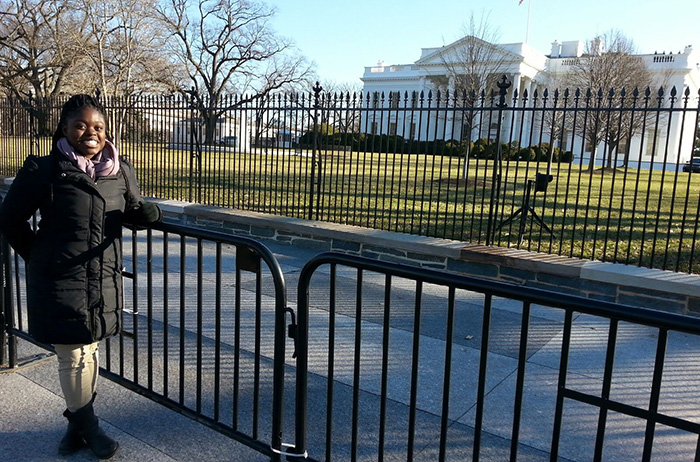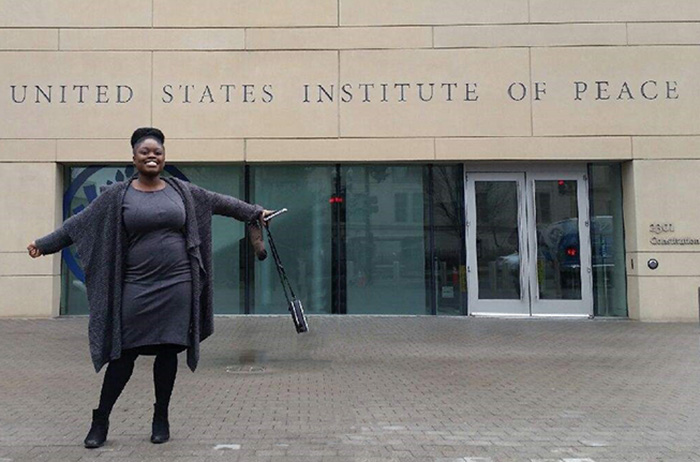The Value of the Digital Handshake

Frieda Adu-Brempong ’16
Last spring, policy-management major Frieda Adu-Brempong ’16 joined forces with three fellow Americans and four Japanese students in an intercultural competition aimed at developing social programs to help the tsunami-torn regions in Japan. The prize? A trip to Japan this summer. Below, she describes her team’s award-winning project, her experiences in Copenhagen, Denmark, and some of her favorite things about Dickinson.
Major:
Clubs, organizations and activities:
Exiled Poetry Society, African American Society, CommServ and the Norman M. Eberly Multilingual Writing Center Writing Center (peer tutor).
Honors/scholarships/awards:
Posse Leadership Scholarship and Dean’s List.
Favorite book:
Flowers for Algernon by Daniel Keyes.
Favorite movie:
Unthinkable.
On choosing Dickinson:
I was sold on the college’s focus on global education and experiential learning.
Favorite place on campus:
Couches in the back of the library.
Favorite Dining Hall food:
Everything from the KOVE and the salad bar.
As a kid, I wanted to be …
… a pharmacist, because it’s what my father tried to drill into my head. Now my sister studies chemistry, and that has become strictly her thing!
Post-Dickinson plans:
My dream job is to become an international urban-planning consultant … and to learn how to play the drums.
About my current research:
For my independent-study project, I am doing a comparative analysis on immigration policies in the United States and South Africa. I have always had an interest in immigration, and one day my supervisor briefly mentioned how South Africa’s immigration policy and border relations had an effect on [South Africa’s] health care system. From then on, I took an interest in this region.
Biggest influence:
My middle-school English teacher, Ms. Ruiz. She saw something in me when I couldn’t see it in myself.
About my most recent internship:
Last spring I interned at the D.C. hub of GRM Futures Group International, a global health-consulting firm that works on development projects supported by major funders. This internship appealed to me because it is internationally focused; it is part of the private sector, which was new to me; and it’s driven by data and technology. Through this internship, I learned more about what motivates me in the workplace, how to be resourceful and how to manage multiple tasks.
Proudest accomplishment:
It’s a small accomplishment, but when I was abroad, I was really proud of myself for taking on Copenhagen’s biking culture right away.
On studying abroad:
I studied abroad in Copenhagen, Denmark [through the Danish Institute for Studying Abroad], in fall 2014. The highlight of studying in Denmark was living with a Danish host family and being able to travel to different European cities with my Urban Studies core course.
In spring 2014 I studied [through the college’s Washington Center program] In Washington, D.C. I participated in a program based on strengthening civil society and a contest, for which my team earned the first-place prize: a trip to Japan this summer.

About that intercultural contest:
I [took part in] a program called “Building the TOMODACHI Generation: Engaging U.S. and Japanese University Students in Social Problem-Solving” [a partnership between The Washington Center for Internships and Academic Seminars (TWC) in Washington, D.C., and the U.S.-Japan Research Institute (USJI), which brought 15 U.S. undergraduate students from different universities together with 20 Japanese undergraduate students to engage in intercultural problem-solving]. For the first few weeks, the American students took part in a seminar, Civil Society, taught by a nonprofit expert; we also got the chance to hear from panelists like the marketing director of the Red Cross, and the marketing director of Global Giving. Then our Japanese counterparts joined us for two weeks to share in the experience and competition.
We were divided into groups of seven (three Americans and four Japanese) and were tasked with designing a project for the Tohoku region of Japan, which was drastically impacted by the earthquake and tsunami in March 2011. We were instructed to include a working budget and fundraising strategies in our project, to form cross-sector partnerships, and draw up steps for executing the plan. We also [could seek advice from] project-management Ph.D. students and faculty from Georgetown University.
My team wanted to address the issue of isolation of elderly people in the Japanese city of Rikuzentakata who are living in temporary housing (approximately 20 percent of that city’s population). So we planned a technology course for elderly people in the region that would focus on building connectedness. Outside of basic computer skills, elderly people would learn to connect with their friends and family via social-network services and regain their sense of belonging in their local and wider communities. It was called “Digital Akushu,” which means digital handshaking.
Our Japanese friends will present the project again to the program's major donors when they return to Japan, and [the American members of our team] will travel to Japan this summer to continue the work.
Most important thing I’ve learned so far:
I’ve learned that it is absolutely OK to take my passions and work seriously, but I don’t necessarily have to take myself so seriously.
My personal philosophy:
Don’t just stand for something, stand with somebody.
Learn more
- Department of Policy Studies
- “Ten Students, Two Continents, One Project”
- Global Study & Engagement
- More Student Snapshots
- Latest News
Published June 19, 2015